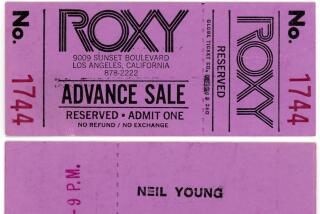Late-Blooming Nigel Hawthorne Enjoys ‘Madness’ of King-Size Role in Hytner’s Film
- Share via
LONDON — Late bloomers don’t come much later than Nigel Hawthorne.
He is 65, and it has taken him until now to become an internationally recognized film actor--for his moving performance in the title role of “The Madness of King George.”
Only now, after 45 years in the theater, is he finally directing a play himself--the 18th-Century drama “The Clandestine Marriage,” in which he is also starring here in the West End.
Indeed, Hawthorne was an obscure actor until he was 50, when he first starred in the British TV series “Yes, Minister,” playing a devious senior civil servant, Sir Humphrey Appleby, who advises a dimwitted prime minister.
A late bloomer? Hawthorne didn’t even learn to drive until he was 50.
Gradually Hawthorne’s career has turned around, and now it seems to have exploded. He was not totally unknown in America (“Yes, Minister” had a following among Anglophile PBS viewers) but his role as King George has catapulted him from anonymity to a place on the short list for the best actor Oscar.
“I’m inordinately proud of the film,” he said in his dressing room at the Queen’s Theatre, an hour before going onstage in “The Clandestine Marriage.” “There was extraordinary dedication, even down to the extras. Nick Hytner has pulled off a terrific job.”
Hawthorne, a quietly spoken, courteous man with a modest, friendly manner, is delighted by his sudden transformation as a leading man on film, and accepts that the Samuel Goldwyn Co. took a chance in agreeing he could play George III on film.
“It was wonderful that Alan Bennett insisted on Nick and me doing the film after we’d done it as a play,” he said of the playwright.
In fact, Hawthorne has already known the disappointment of being edged out of a film adaptation of a play. He memorably played C. S. Lewis in the stage version of “Shadowlands,” winning rave reviews in London and a Tony on Broadway, and was crestfallen when Anthony Hopkins was given the film role.
“But of course I quite understood, and I wasn’t surprised,” he said. “Tony’s a film star. I’m not.”
Critics have noted that Hawthorne plays George III, widely regarded as a tyrant in America, with tremendous sympathy.
“I feel very compassionate toward him,” he said. “I know he’s regarded as a big bad royal, but I think we restored a little of his reputation by doing this film. People will see he was just a man. OK, he was bluff and impatient and said a lot of foolish things. But then we all do.
“Basically the film is about one man’s journey. You see cracks starting to appear, then there’s a disintegration, and then he’s patched up again. It’s only coincidental that he’s a king.”
Having played King George now for four years onstage and on film, Hawthorne has reached his own conclusions about kingship.
“It’s absurd that we dress people up in these costumes and parade them about when they have no function,” he said. “But although there’s talk that the royals are redundant, I think it would be sad if we jumped them out and chucked away those years of our history. That’s what makes us (British) as a people so interesting.”
Hawthorne has decided he now likes working in film: “It suits me quite well, though it hasn’t in the past. I now feel I have a certain confidence, a certainty of step, that I didn’t have before.”
His forays into American films have not been to his liking. He would prefer to forget his work alongside Clint Eastwood in “Firefox” (1982). Nor did he enjoy his role in “Demolition Man” (1993), with Sylvester Stallone, which he has never seen.
“I played the governor of the Los Angeles penitentiary,” he said dryly. “Perfect casting, you might think. I was a villainous character who dressed like a Japanese and had a French name, Dr. Cocteau.” He pauses for effect. “It could have been a . . . richer experience. Come to think of it, I could have been richer too.”
So whatever fate awaits him this year, Hawthorne will not move to Hollywood: “I can’t make that mental adjustment,” he said. “I don’t want swimming pools in my life, and I don’t like all that heat. Also, I don’t think the studio activity I’ve encountered is very appealing--it’s rather intimidating, aggressive and unfriendly.”
Instead, he will stay in Britain; much of this year will be devoted to finding a new home. The tranquillity of his idyllic house in the Hertfordshire countryside is threatened after 10 years by the construction of a new motorway services area nearby; Hawthorne has spent $50,000 on legal fees trying in vain to halt construction.
“I intend to wait and see what happens,” he said of the industry reaction to “The Madness of King George.” “If some of the buzz rubs off on me, fine. I’ll be happy to read some scripts. If it doesn’t, I’ll just sit at home in my garden and play with my dogs.”
He has never given much thought to retirement but finds stage work arduous.
“I could give up theater quite easily,” he admitted. “It’s the commitment of concentrated work, you see. There really are easier ways to make a living.”
Hawthorne is now waiting to see how “The Madness of King George” fares with American audiences.
“The early reaction is heartening, but I’m very calm about it,” he said. “Put it this way--I’m not waking up in the middle of the night rehearsing any acceptance speeches.”
Maybe not. But it would be a delicious irony if King George, the man who lost America for Britain, could take home a trophy from Britain’s former colony.
More to Read
Only good movies
Get the Indie Focus newsletter, Mark Olsen's weekly guide to the world of cinema.
You may occasionally receive promotional content from the Los Angeles Times.










